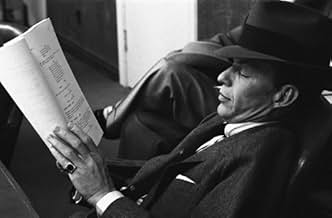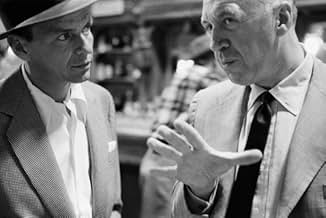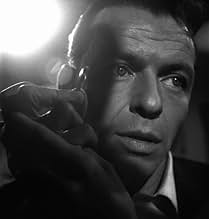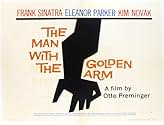VALUTAZIONE IMDb
7,3/10
12.914
LA TUA VALUTAZIONE
Un tossico deve affrontare la sua vera identità per combattere la sua dipendenza.Un tossico deve affrontare la sua vera identità per combattere la sua dipendenza.Un tossico deve affrontare la sua vera identità per combattere la sua dipendenza.
- Regia
- Sceneggiatura
- Star
- Candidato a 3 Oscar
- 3 vittorie e 8 candidature totali
Jered Barclay
- Junkie in Lock-Up
- (non citato nei titoli originali)
Leonard Bremen
- Cabbie in Lock-Up
- (non citato nei titoli originali)
Paul E. Burns
- Suspenders in Lock-Up
- (non citato nei titoli originali)
Pete Candoli
- Jazz Musician
- (non citato nei titoli originali)
Herschel Graham
- Club Safari Patron
- (non citato nei titoli originali)
Harold 'Tommy' Hart
- Officer Kvorka
- (non citato nei titoli originali)
Recensioni in evidenza
Great story. Gritty 50's melodrama played very well by Sinatra and Novak. Great comedic performance by Arnold Stang who definitely deserved more attention after this film.
Also contains one of the most brilliant soundtracks to a film ever made. Sinister accompaniment to Frankie Machine's spiraling demise, it plays so well as the unrelenting "monkey on his back" appears again and again.
Great lingo, too. Very happy the word "lush" is used to describe an alcoholic. Very cool.
Great cinema. An underappreciated piece of American genius.
Also contains one of the most brilliant soundtracks to a film ever made. Sinister accompaniment to Frankie Machine's spiraling demise, it plays so well as the unrelenting "monkey on his back" appears again and again.
Great lingo, too. Very happy the word "lush" is used to describe an alcoholic. Very cool.
Great cinema. An underappreciated piece of American genius.
A strung-out junkie (Frank Sinatra) deals with daily demoralizing drug addiction while crippled wife (Eleanor Parker) and card sharks continue to pull him down.
While this is not the first film to deal with drugs, it is probably the first to deal with them in a very serious manner. "Reefer Madness" and "Cocaine Fiends", for example, can be written off as humorous nostalgia. This film, on the other hand, is decades ahead of "Trainspotting" and "Requiem For a Dream". (Did you even know heroin addiction was prominent in the 1950s?)
Variety called the film "a gripping, fascinating film, expertly produced and directed and performed with marked conviction by Frank Sinatra as the drug slave." I agree for the most part, though I really did not enjoy Sinatra's acting as much as many others did, I think. Otto Preminger is a first-rate director, and I hope this film gets the respect it deserves over the long run (I found the 50th anniversary release to be not nearly cleaned up enough).
While the focus is heroin and addiction, one could also make a case about this film being about love. Frankie's wife brings him down, encourages him to go back to his old habits, turns him away from his dreams. Molly (Kim Novak) does just the opposite. Divorce and adultery are hardly ever positive topics, but in this film you almost hope that Frankie goes that route.
While this is not the first film to deal with drugs, it is probably the first to deal with them in a very serious manner. "Reefer Madness" and "Cocaine Fiends", for example, can be written off as humorous nostalgia. This film, on the other hand, is decades ahead of "Trainspotting" and "Requiem For a Dream". (Did you even know heroin addiction was prominent in the 1950s?)
Variety called the film "a gripping, fascinating film, expertly produced and directed and performed with marked conviction by Frank Sinatra as the drug slave." I agree for the most part, though I really did not enjoy Sinatra's acting as much as many others did, I think. Otto Preminger is a first-rate director, and I hope this film gets the respect it deserves over the long run (I found the 50th anniversary release to be not nearly cleaned up enough).
While the focus is heroin and addiction, one could also make a case about this film being about love. Frankie's wife brings him down, encourages him to go back to his old habits, turns him away from his dreams. Molly (Kim Novak) does just the opposite. Divorce and adultery are hardly ever positive topics, but in this film you almost hope that Frankie goes that route.
Heroin, repression, lies, lust, claustrophobia and jazz: long before "Trainspotting," this was how you made an expressionistic film about drug addiction. Still stylishly evocative, thanks to Preminger's direction and Bernstein's pounding score, the adaptation of Nelson Algren's novel stands out for its grotesques, not least of which is its title character -- Preminger's narrative pacing never flags, but he somehow manages to linger on a number of minor characters whose weird, ruined lives cling to a patchwork dignity, and the effect is pitched somewhere between the social justice aims of "On the Waterfront" and the voyeurism of "Touch of Evil." Sinatra's performance, sweaty with vulnerability, is among his best. The supporting cast is also extremely good, but it's the urgent soundtrack and anxious camera, constantly tracking over a Caligari-skewed slice of the bowery that remain in memory.
Sinatra is thoroughly convincing as the addict in this grim horror story of what life is like for someone who has lost his soul to drugs. This is film noir made even more noir by the drab sets and lighting. We go through the terrifying experience of a man who is trying to escape from the monster he has placed on his own back.
Elmer Bernstein's score is a mixture of jazz and symphony that makes the addict's frightful journey even more believable to the audience.
This film opened the topic of drug addiction the way LOST WEEKEND broached the subject of alcoholism. At least people could talk about these addictions a little more freely.
Elmer Bernstein's score is a mixture of jazz and symphony that makes the addict's frightful journey even more believable to the audience.
This film opened the topic of drug addiction the way LOST WEEKEND broached the subject of alcoholism. At least people could talk about these addictions a little more freely.
The Man With a Golden Arm was one of a trio of great films around that same time that dealt with drug addiction. The other two were Monkey On My Back and A Hatful of Rain. But I think of the three this one is the best.
Maybe if Otto Preminger had shot the thing in the real Chicago instead of those obvious studio sets the film might have been better yet. Who knows, maybe Preminger couldn't get enough money to pay for the location. It's the only flaw I find in the film.
Frank Sinatra is a heroin addicted card dealer who was busted for covering for his boss Robert Strauss when the game was raided. He took the cure while in jail and wants a new life as a jazz drummer. But a whole lot of people are conspiring against him.
First Bob Strauss who wants him back dealing, especially because a couple of heavyweight gamblers are in town. He uses a few underhanded methods to get Sinatra's services back. Secondly Darren McGavin is the local dope dealer who wants Sinatra good and hooked as a customer again. And finally Eleanor Parker his clinging wife who's working a con game to beat all, just to keep him around.
Frank Sinatra got a nomination for Best Actor for this film, but lost to Ernest Borgnine in Marty. Sinatra might have won for this one if he hadn't won for From Here to Eternity in the Supporting Actor category a few years back and that Marty was such an acclaimed film in that year. His scenes going through withdrawal locked up in Kim Novak's apartment will leave you shaken.
Eleanor Parker does not get enough credit for her role. She's really something as the crazy scheming wife who wants Sinatra tied to her no matter what the cost. If she had not been nominated that same year for Interrupted Melody, she might have been nominated for this. 1955 marked the high point of her career.
Darren McGavin got his first real notice as the very serpentine drug peddler. His performance is guaranteed to make your flesh crawl.
Elmer Bernstein contributed a great jazz score to accentuate the general dinginess of the bleak Chicago neighborhood the characters live in. Not a place you'd want to bring up your family.
Maybe if Otto Preminger had shot the thing in the real Chicago instead of those obvious studio sets the film might have been better yet. Who knows, maybe Preminger couldn't get enough money to pay for the location. It's the only flaw I find in the film.
Frank Sinatra is a heroin addicted card dealer who was busted for covering for his boss Robert Strauss when the game was raided. He took the cure while in jail and wants a new life as a jazz drummer. But a whole lot of people are conspiring against him.
First Bob Strauss who wants him back dealing, especially because a couple of heavyweight gamblers are in town. He uses a few underhanded methods to get Sinatra's services back. Secondly Darren McGavin is the local dope dealer who wants Sinatra good and hooked as a customer again. And finally Eleanor Parker his clinging wife who's working a con game to beat all, just to keep him around.
Frank Sinatra got a nomination for Best Actor for this film, but lost to Ernest Borgnine in Marty. Sinatra might have won for this one if he hadn't won for From Here to Eternity in the Supporting Actor category a few years back and that Marty was such an acclaimed film in that year. His scenes going through withdrawal locked up in Kim Novak's apartment will leave you shaken.
Eleanor Parker does not get enough credit for her role. She's really something as the crazy scheming wife who wants Sinatra tied to her no matter what the cost. If she had not been nominated that same year for Interrupted Melody, she might have been nominated for this. 1955 marked the high point of her career.
Darren McGavin got his first real notice as the very serpentine drug peddler. His performance is guaranteed to make your flesh crawl.
Elmer Bernstein contributed a great jazz score to accentuate the general dinginess of the bleak Chicago neighborhood the characters live in. Not a place you'd want to bring up your family.
Lo sapevi?
- QuizFrank Sinatra jumped at a chance to star in the film before reading the entire script.
- BlooperIn a scene about twenty minutes in, as the camera exits the bar following Frankie, the jukebox can be seen to slide out of the way of the camera at the bottom of the screen.
- ConnessioniEdited into Bass on Titles (1982)
I più visti
Accedi per valutare e creare un elenco di titoli salvati per ottenere consigli personalizzati
- How long is The Man with the Golden Arm?Powered by Alexa
Dettagli
- Data di uscita
- Paese di origine
- Lingue
- Celebre anche come
- El hombre del brazo de oro
- Luoghi delle riprese
- Azienda produttrice
- Vedi altri crediti dell’azienda su IMDbPro
Botteghino
- Budget
- 1.000.000 USD (previsto)
- Lordo in tutto il mondo
- 4652 USD
- Tempo di esecuzione
- 1h 59min(119 min)
- Colore
- Proporzioni
- 1.85 : 1
Contribuisci a questa pagina
Suggerisci una modifica o aggiungi i contenuti mancanti
























